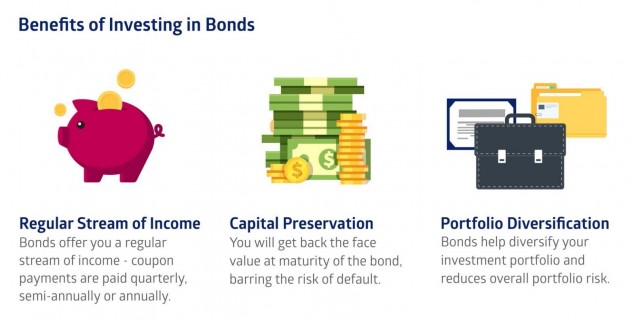Investment Basics For Newbies

For most of us at this age, a “worthwhile investment” often means paying for a premium subscription to Netflix, or a classic pair of sneakers. Ask me at the end of a long, trying day and I’ll tell you that splurging on pizza is the only investment worth being made by a sensible grown-up. Only after a significantly emptier bank account am I reminded that this is only briefly true.
A full stomach’s great, but a proper investment is one that can reward you with actual financial returns and security. And unlike what’s commonly misperceived, investing isn’t something that only “older adults” or wealthy people can do; if you’re currently working your first part-time job, it’s something that even you can start considering.
Note: If you’re really interested in investing, Singapore’s largest investment fair (INVEST Fair) will be happening on 5-6 August 2016 at Suntec City. Details at the end of the article.
1. If you’re investing in Singapore, you’ll need a CDP Account
If you’re serious about investing in Singapore, step number one is to open a Central Depository (CDP) account. The CDP is part of the Singapore Exchange (SGX), which will oversee all your shares. It’s regulated by the Monetary Authority of Singapore (MAS), so you know that it’s safe from potential frauds.
Opening an account is simple – you can either do it yourself by sending in your application form or head down to the nearest brokerage firm where an agent can help you through the process.
2. If you want high-risk-high-return, be an active investor. If you’re cautious, be a passive investor

You’ll need to know yourself before you can discern what investments to make. The type of investor you’re going to be depends on your:
- Risk appetite. All investments carry risk, but if you’re a first timer, it’s good to first chill and take up a more conservative portfolio (aka your range of investments). It can also help lessen your likelihood of losing money. Whether you’re an active or passive investor will also determine the amount of returns you’ll make.
- Financial obligations. Figuring out your expenses will help to determine which investments you can afford.
- Reason for investing. Investments aren’t just for retirement. Do it right and it can serve as secondary income for you to pursue endeavors like further studies, globetrotting or starting your own business.
- Investment horizon. This refers to the period of time that you’ll commit to reach your financial goals. Time is also an investment; a longer investment horizon typically means that you’ll be more capable of riding out potential market upsets.
Tip: As with any financial endeavour, it’s good practice to first consult a financial advisor or broker and figure out how investments can factor into your financial planning. Some consultations are even free-of-charge!
3. These are the 3 safest investment options for young Singaporeans…

As a newbie, “diversify your portfolio” is a phrase that you’ll hear plenty. It’s just a cheem way of saying “don’t put all your eggs in one basket”. Owning different investments can help reduce risk by letting them balance out each other’s gains and losses. Here are three types of investments that are great for beginners:
FYI: Bonds are funds that investors “lend” to the government or a company over a short period of time, and at an interest rate. This is great if you want steady returns since you’ll get paid in interest every few months.

Image credit: SGX
a. Government bonds
Locally, we have the Singapore Savings Bonds (SSBs) which is one of the safest investments that you can make. Since it’s by the government, you can trust that it’s relatively freer of risk than most – but it will provide you with lesser returns. It’s also flexible in that you can withdraw your cash whenever you want (except after a grace period of one month), with no penalty.
b. Corporate bonds
These are similar in concept to government bonds, except that you’re loaning money to a specific company. These bonds can offer higher returns – but the risk involved is also higher.
c. Exchange Traded Funds (ETFs)
Exchange Traded Funds (ETFs) are a little more complicated, so we’re going to zone in on the local Straits Times Index (STI) ETFs. Don’t let the abbreviations frighten you – by buying a single unit of STI ETF, you’re making an investment in 30 of the largest companies in Singapore.
Companies like Singtel, DBS and CapitaLand make up the STI, an index which is representative of the overall Singapore stock market. By having shares (aka ownership) in each of these companies, you automatically diversify your portfolio and spread out potential risk.
Bonus: Once you’ve been at it for some time, you may want to consider looking into Real Estate Investment Trusts (REITs). It’s increasingly common for Singaporeans to buy properties as investments, but with REITs, you don’t purchase actual property. Instead, you’ll be purchasing units of a trust that are relatively more affordable than buying a condo unit itself.
4. …and undergrads who save as little as $100 a month

PSA for all the twentysomethings: Investment is a viable financial revenue that even a student who’s working part-time can take up. Your $100/month savings are in themselves an investment that can grow way more significantly the earlier that you begin investing.
Compared to saving in a bank, investments can provide you with much greater returns. If you start young, you’re also likely to have a more diverse portfolio and a more intuitive understanding of making the best investments decisions once you’re older.
SGX has illustrated simulated portfolios for young adults at two different stages of their adulthood. These are “safe” recommended portfolios for Singaporeans:

As a tertiary student with limited income, it’s preferable to keep your investments low-risk. STI ETFs and Singapore Savings Bonds are among the more common options for more conservative portfolios. | Image credit: SGX

When you’ve invested for a while, you’ll have a better grasp of the type of investments that you’re willing to make. Above is an example of what a more diverse portfolio can look like – one that affords you making riskier investments likes REITs and global ETFs. | Image credit: SGX
5. Use algorithm-based trading bots for instant advice

Image credit: Giphy
Point to any episode of Black Mirror and it’s easy to be wary of technological advancements. It’s not all bleak though, especially with innovations like robo-advisors. Robo-advisors function the same way as financial advisors; they ask you questions to determine your financial profile. The difference lies in their efficient use of algorithms to help come up with your investment portfolio.
Thanks to this mathematical magic, you can expect limited physical social interaction when making your investment-related decisions – perfect if you’re an introvert. Locally, you’ll be able to find paid robo-advisors like AutoWealth and Crossbridge to assist you with your investing needs.
FYI: Robo-advisory services aren’t just a fad. MAS has introduced new initiatives to make them more accessible to local investors – so you can rest assured that it’s not just experimental technology.
6. Know where to find online & offline communities who can help
“You are not alone” isn’t just an enduring MJ song, it’s also a maxim that is applicable to investing. When in doubt, engage fellow investors through any of these community-based outlets:
a. The Facebook of Investing – InvestingNote
Social trading is available in different forms, but if you’re looking for one that gives you the same kind of online sensibilities as Facebook, then InvestingNote will be your best bet. With your own dashboard and a customized newsfeed that’s kept up-to-date with posts by investors you follow, the only things that set it apart from FB are its green interface and a major lack of pesky Candy Crush requests.

You can post, comment and like! | Image credit: InvestingNote
And don’t be quick to dismiss it – people do actively reply and comment on your posts. Better yet, users here are super generous with their likes.
b. The Comic-Con of Investing – INVEST Fair
If physical social interaction is more your drift, then you can check out INVEST Fair. Sans the elaborate costumes of cosplay conventions, it’s got all that you’d expect from a convention focused on investments – investor booths, exhibitions and the opportunity to rub shoulders with all sorts of investors, from long-time experts to fellow freshies.

Attend panels and visit different booths | Image credit: INVEST Fair
And if you feel like you’re ready, some of the participating partners can even help you open an account to get you started with investing.
7. If all else fails, go on autopilot and copy a good investor’s trades
Copying may be a deed that’s generally frowned upon, but when it comes to investing, it’s actually common practice. Thanks to social trading platforms, you can follow your favourite investors and model your investment planning after theirs – all through nothing more than a mobile app.

You can follow millionaires, billionaires and “blue whale” investors. | Image credit: Spiking
Social trading platforms like Spiking, C 7 Traders and eToro work off of user-generated content – they’re basically a combo of social media + investing. Much like how you’d trawl IG feeds and lurk around your crush’s profile, social trading platforms enable you to view other investors’ portfolios to see how well they’re doing. If you like what you see – like any IG thirst trap – all you have to do is hit follow and you’ll be making the same investments in short time.
It’s all pretty foolproof – and as is aptly described by C 7 Traders’ three-step social trading process, you just have to “Search, Copy and Earn”.
Get on the right track with your first investment
Much like getting your first insurance policy, there’s plenty about investing – and adulting in general – that may have you feeling a little bit stumped before you even get started. Keep at it anyway, especially if you want to have a financial future that’s relatively more gainful than one where you simply rely on bank interest.
As the cost of living increases, so will the likelihood of your expenses overtaking your income. Investments can help you avoid this by letting your money work for you – perfect for the “work smart” 21st century adult.
Learn more about investing at INVEST Fair 2017

Image credit: INVEST Fair
The largest investment event in Singapore, INVEST Fair is the go-to space for all things investment-related. There will be seminars, panels and exhibits happening at the two-day event where you’ll get to rub shoulders with experienced investors and learn from industry experts like Christopher Versace and Singapore’s own Adam Khoo.
If you’re new to investing, look out for these two panels:
Investing at 20s, 30s, 40s

Image credit: INVEST Fair
One of the best ways to learn about investing is by hearing directly from relatable individuals. During this panel discussion, local bloggers like Alison Liew (Heartlandboy) and Brian Halim (foreverfinancialfreedom) share investing tips and reflect on their personal experiences of what it’s like getting into investing at different stages of life.
When: 6 August, 10.30am-11.15am
Where: Seminar Room 3
Disruption in the Financial Scene

Image credit: INVEST Fair
Much like how social media has influenced our social interactions, fintech (financial technology) has been affecting the way the finance industry works. Find out how such digital disruption – including advances like robo-adviser and social trading platforms – factor in today’s financial scene.
When: 6 August, 2pm-2.45pm
Where: Seminar Room 3
With such novice-friendly panels and even “Expert in 30 Minutes” seminars, this year’s instalment promises to be super accessible for first-timers, so rest assured that you won’t have a difficult time navigating the convention grounds.
Admission for the event is free but make sure you register online to enjoy twice the opportunity at the lucky draw!
Find out more about INVEST Fair 2017 here
This post was brought to you by ShareInvestor.
